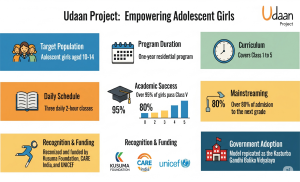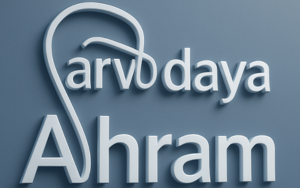The Udaan Project, an innovative and deeply impactful initiative spearheaded by Sarvodaya Ashram, stands as a testament to transformative residential education. Designed with a profound understanding of the critical need to re-engage out-of-school adolescents, the program’s primary objective was to identify adolescent girls aged 10 to 14 years who had dropped out of formal schooling, provide them with an accelerated foundational education from Class 1 to 5 within a single year, and successfully mainstream them into the formal education system.

Program Pedagogy and Curriculum Design:
Functioning as a meticulously crafted bridge course, Udaan uniquely identified and nurtured the individual needs and inherent potential of each participant. The curriculum was ingeniously designed to cover the core learning objectives of all essential subjects within the stipulated accelerated timeframe. To achieve this, the pedagogical approach involved conducting three daily classes, each two hours in duration.
Crucially, to prevent academic burden and foster genuine engagement, each two-hour session incorporated activity-based and fun-based learning methodologies. This approach ensured that education was not merely transmissive but interactive and enjoyable, fostering a love for learning. Beyond academic rigor, the program placed significant emphasis on inculcating and nurturing human and social values in the students, promoting holistic personal development. Regular project works were assigned, specifically designed to stimulate imagination, encourage critical thinking, and draw out the best in each student.
The core subjects covered in the Udaan curriculum included language, mathematics, environment, and sociology. A foundational knowledge of English was also imparted. A distinctive feature of the Udaan model was the inclusion of sociology, a subject not typically taught at the primary level in conventional schools. This was integrated into night classes, specifically to enable the girls to develop a deeper understanding of their immediate environment, social dynamics, and community. Furthermore, students actively engaged in a variety of co-curricular activities such as role play, skits, debate competitions, and art competitions, enhancing their communication skills, self-expression, and confidence.
Holistic Development and Outcomes:
Girls graduating from the Udaan centres consistently demonstrated remarkable transformations. They emerged as extroverted, self-confident, cooperative, and responsible individuals. Beyond academic proficiency, they were not only well-informed but also possessed the crucial capacity to independently seek out and access newer sources of information, a vital skill for lifelong learning.
The success of the Udaan centres was significantly attributed to the open, constructive, and development-oriented environment fostered within the Ashram. This nurturing atmosphere provided ample opportunities for learning in a non-formal, experiential manner, complementing the structured curriculum.
Community Engagement and Sustained Impact:
The Udaan Project actively extended its reach beyond the residential setting by fostering strong ties with parents through community education initiatives and regular meetings. This engagement ensured parental understanding and support for the girls’ educational journey. Crucially, contact was maintained with the girls even after their graduation from the program, illustrating a profound commitment to their long-term educational trajectory.
Ashram workers played a critical and proactive role in ensuring the girls’ seamless transition into the formal education system, diligently assisting with admission to subsequent classes and providing ongoing support to ensure their retention. This dedicated follow-up yielded impressive results: in each session, over 95 percent of girls successfully passed Class V, and over 80 percent secured admission into the next grade, signifying the program’s efficacy in mainstreaming.
Recognition and Replication:
The innovative and impactful Udaan model received widespread recognition and funding from esteemed national and international organizations, including the Kusuma Foundation, CARE India, and UNICEF. This external validation underscores the project’s proven success and its potential for broader replication, serving as a beacon for addressing the critical challenge of adolescent girl dropouts in vulnerable communities.
This model was adopted and replicated by the Government of India in the form of Kastusrba Gandhi Balika Vidyalaya to improve the enrolment status and to provide quality education to the girls from the marginalized sections of the society.

